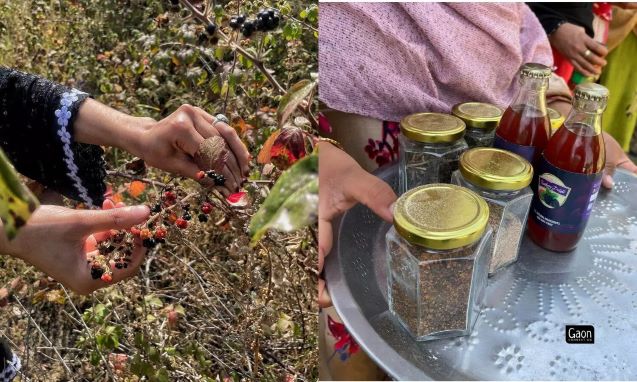Network, a non-profit, is helping the women of TY Shah village in Kashmir to produce and market the jam they make out of the wild raspberries found in the local forests.
Srinagar, Jammu & Kashmir The TY Shah village in Kashmir is experiencing the joy of jam. Women in the village gather the abundance of wild raspberries in forests nearby, add favourite local spices into it, stir it all into jam and bottle the result to sell to customers locally and elsewhere.
These Kashmiri women use secret recipes of the region handed down from their moms and grandmothers to make the fruity jam which is sold with the brand name of Wild Raspberry Jam.
A non-profit called Grassroots Innovation Augmentation Network (GIAN) is helping the women to produce and market the jam they make out of the wild raspberries they forage in the forests. It’s been three years that over a 100 women of the village in Baramulla district are involved in jam making.
“Our jam is made using old recipes. By making these jams and selling them we are not just earning an income but also safeguarding our cultural traditions,” 33-year-old Aisha Jan, one of the women who make jam, told Gaon Connection.
Before starting their jam-making business, most of the women in TY Shah Village worked at home or helped out in farming. They did not earn any money of their own.
Then GIAN stepped in and trained them in jam making. More than a 100 women learnt the art of hand-picking wild raspberries, cherries, and other fruits growing in the neighbouring forests, cleaning and processing them into jam.
Every morning armed with baskets, the women set out to carefully select only the ripest and juiciest of fruits they found. They avoid the use of any preservatives, additives, or artificial sweeteners and the result is a range of jams bursting with the natural flavours and aromas of the raspberry.
These women are paid by the non-profit on the basis of the collection of the raspberries. On an average, each of the women earns a monthly income that ranges from Rs 5,000 to Rs 6,000.
“The abundance of wild raspberries and other fruits in our forests is astounding. By utilising these fruits, we not only reduce waste but also promote sustainable practices and preserve the natural resources of our village,” Asma, a woman from the village who now makes jam, told Gaon Connection.
A portion of a house belonging to one of these women has been modified as a workshop. These women assemble at this workshop where they participate in daily meetings and plan their tasks.
Initially, the women started out on a small scale, producing jam in their homes using traditional methods. As their business gained momentum, they established a cooperative, pooled their resources and skills to scale up production.
There are a total of 111 women working in this project which is supported by GIAN, headquartered in Ahmedabad, Gujarat. Today the women of T.Y. Shah Village collectively make nearly 250 kgs of jam a year and this could increase depending on the demand.
At present, the annual turnover of this project is approximately Rs 500,000 to Rs 8,00,000.
“Each bottle of jam brings with it a story of resilience and determination for the women of rural Kashmir,” said Sabzar Ahmad, co-founder of GIAN. The other founder is Syed Nadeem, and the two of them together have launched GIAN’s livelihood projects in Kashmir.
Women harvest berries from the forest during the peak season in June and July and process them into delicious jams. The exact volume of production may vary each year, depending on the availability of berries.
According to the women, it takes them almost three weeks for the manufacturing process to conclude. It takes 1.5 kilograms of wild raspberries to make a bottle of jam weighing 500 grams, which is sold for Rs 500-600 per bottle.
The women have also started selling their products online, thereby expanding their customer base. These jams are sold through the official website of GIAN. “This initiative has given us a chance to support our families and contribute to the local economy.
It feels amazing to have a source of income that we can proudly call our own,” Humaira Mohideen, group leader of the women, told Gaon Connection.
Razia Yousuf, another jam maker is delighted as with the money she earns, she feels she can safeguard the future of her children. “I am supporting my family now and it is a difficult feeling to explain,” Yousuf told Gaon Connection.
The success of their jam business has improved the lifestyle of the inhabitants of the village. They are able to afford better education for their children, access healthcare facilities, and repair and rebuild their homes. The intangible gain has been that the women now have an increased sense of self and their status in the community has gone up.
“The jam-making project in T.Y. Shah village is an example of how innovative ideas and support can transform communities. These women have taken control of their own destinies and have become role models for others,” co-founder Ahmad told Gaon Connection.
He said the future of the women looked bright as the demand for the jam they made was going up. “They are now looking at newer flavours and more markets to sell their products such as preservative-free juices and oils,” he added.
GIAN helps the women explore various avenues to sell their jam both locally and beyond their village. These women also supply their products to local stores, markets, and tourist areas. They also participate in regional fairs and exhibitions.
There are also plans afoot to expand their product base to include makeup items like lipsticks and lip balms. GIAN also has plans to train more women in neighbouring villages, and enable them to start their own ventures.__gaonconnection.com





